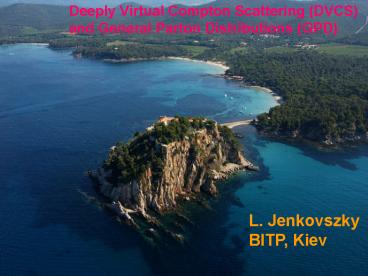Deeply Virtual Compton Scattering DVCS - PowerPoint PPT Presentation
1 / 48
Title:
Deeply Virtual Compton Scattering DVCS
Description:
BITP, Kiev. DVCS kinematics. X. DIS. The proton is smashed (completely destroyed) pQCD ... QCD-factorized form of a DVCS scatterigg amplitude ('box. GP ... – PowerPoint PPT presentation
Number of Views:145
Avg rating:3.0/5.0
Title: Deeply Virtual Compton Scattering DVCS
1
Deeply Virtual Compton Scattering (DVCS) and
General Parton Distributions (GPD)
L. Jenkovszky BITP, Kiev
2
(No Transcript)
3
DVCS kinematics
4
DIS
X
The proton is smashed (completely destroyed)
5
QCD-factorized form of a DVCS scatterigg
amplitude (box
GP
pQCD
non-perturbative region
6
DIS
Reconstruction of the DVCS amplitude from DIS
or
?
7
Various limits
DVCS
General, symmetric
8
Tomograpy and/or holography?
9
Longitudinal and transverse dimensions
10
Nuclear holography
11
(No Transcript)
12
-t
0
13
K. Kumericki, D. Mueller, K.-Passek-Kumericki,
hep-ph0805.0152 (May, 2008)
14
GPDs cannot be measured directly, instead they
appear as convolution integrals, difficult to be
inverted !
Handbag
15
K. Kumericki, D. Mueller, K.-Passek-Kumericki,
hep-ph0805.0152 (May, 2008)
16
-t
0
17
18
Resonance region (JLab) R. Fiore, A. Flachi,
L.J., A. Lengyel, and V. Magas A kinematically
complete analysis of the CLAS Data on the proton
structure function F_2 in a Regge-Dual model,
Phys. Rev. D68 (2004) 014004.
19
(No Transcript)
20
Low-energy diffractionthe background an
s-channel point of view R. Fiore, L.L., V.
Magas, F. Paccanoni, and A. Prokudin J/?
photoproduction in a dual model, Phys, Rev, D75
(2007) 116005. Regge trajectories, including
that of the Pomeron, are nonlinear complex
functions, with a limited real part, which
impliies that the resonances terminate. The
Pomeron trajectory terminates before it would
arrive to the first resonance (with sping 2),
i.e. by construction, Re ?(t) lt 2.
21
(No Transcript)
22
(No Transcript)
23
(No Transcript)
24
(No Transcript)
25
(No Transcript)
26
(No Transcript)
27
(No Transcript)
28
(No Transcript)
29
(No Transcript)
30
(No Transcript)
31
(No Transcript)
32
(No Transcript)
33
The sub-process ?p ?p in a Regge-factorized
form
A(s,t, )
34
A factorized Regge-pole model for
deeply virtual Compton scattering was suggested.
The use of an effective logarithmic Regge-Pomeron
trajectory provides for the description of both
soft (small t) and hard (large t)
dynamics. The model contains explicitly the
photoproduction and the DIS limits and fits the
existing HERA data on deeply virtual Compton
scattering. References R. Fiore, L.J., V.
Magas, and A. Prokudin, Interplay between Q2-
and t-dependences in DVCS. In the Proceedings of
the Crimean Conf., Yalta, 2005 M. Capua, S.
Fazio, R. Fiore, L. Jenkovszky, and F. Paccanoni,
A Deeply Virtual Compton Scattering Amplitude,
arXiv hep-ph/0605319, Phys. Lett. B645 (2007)
161.
35
The DVCS amplitude can be written as
36
(No Transcript)
37
Hence the scattering amplitude, with the correct
signature, becomes
38
Photoproduction- and DIS limits (a
consistency check)
39
(No Transcript)
40
K. Kumericki, D. Mueller, K.-Passek-Kumericki,
hep-ph0805.0152 (May, 2008)
41
(No Transcript)
42
(No Transcript)
43
Modeling GPDs
44
Spin
45
Some publications L. Jenkovszky, V. Magas and E.
Predazzi Resonance-reggeon and parton-hadron
duality in strong interactions, European Phys.
J. A 12 (2001) 361. R. Fiore, A. Flachi, L.
Jenkovszky, A. Lengyel, V. Magas Explicit Model
Realizing Quark-Hadron Duality, hep-ph/0206027,
Eur. Phys. J. A15 (2002) 505-515. R. Fiore, L.
Jenkovszky, F. Paccanoni and A. Prokudin The
Pomeron in Exclusive Vector Meson Production,
arXiv hep-ph/0302195 (Febr. 2003), Phys. Rev. D
68 (2003) 014005. R. Fiore, A. Flachi, L.L.
Jenkovszky, A.I. Lengyel, and V.K. Magas, A
Kinematically Complete Analysis of the CLAS data
on the Proton Structure Function F_2 in a
Regge-Dual Model, arXiv hep-ph/0308178, (August
31, 2003), Phys. Rev. D69 (2004) 014004. R.
Fiore, L.L. Jenkovszky, V. K. Magas, F. Paccanoni
and A. Papa Resonance Masses and widths from
nonlinear Regge trajectories, Nuclear Physics B
(Proc. Suppl.) 99 (2001) 68 - 71 L. Jenkovszky
and V. Magas Relating the small- and large-x
behavior of the structure functions. In the
proceedings of the International ("Blois")
Workshop on Elastic and diffractive scattering,
Pruhonice, Czech Rep., Prague 2002. R. Fiore, L.
Jenkovszky, V. Magas, F. Paccanoni, and A.
Prokudin, J/Psi photoproduction in a dual model,
hep-ph/0702209 Physical Review D 75, No.11, July
2007.
46
Polyakov et al M.V. Polyakov, Hard
exclusive electroproduction of two pions and
their resonances hep-ph/9809483 (1999)
M.V. Polyakov, A.G. Shuvaev On dual
parametrization of generalized parton
Distributions, hep-ph/02007153 (2002) M.V.
Polyakov, Generalized parton distributions and
strong forces inside Nucleons and nuclei,
hep-ph/0210165 (2002) V. Guzey, M.V.
Polyakov, Dual parametrization of generalized
parton distributions, hep-ph/0507183 (2005)
V. Guzey and T. Teckentrup, On dual
parametrization of the proton parton
distruibution function, hep-ph/0607099 (2006)
M.V. Polyakov, Tomography for amplitudes of
hard exclusive processes, hep-ph/07072509
(2007) Alena M. Moiseeva and Maxom
Polyakov, Dual parametrization and Abel
Transform tomography for twist-3 DVCS,
hep-ph/0803.1771 (2008) Kirill M.
Semenov-Tian-Shansky, Forward-like functions for
dual parametrization of GPDs from nonlocal chiral
quark model, hep-ph/0803.2218 (2008) Maxim
V. Polyakov and Marc Vanderhaegen, Taming Deeply
Virtual Compton Scattering, hep-ph/0803.1271
(2008).
47
Analyticity, crossing, duality O.V.
Teryaev Crossing and Random Tomograpy for
Generzlized parton distributions, hep-ph/0102303
(2001) M. Diehl and D.Yu. Ivanov
Dispersion relations for hard exclusive
processes beyond the Born approximation,
hep-ph/0707.0351 (2007) M. Diehl and
D.Yu. Ivanov, Dispersion representations for hard
exclusive reactions, hep-ph/07123533 (2007)
I.V. Anikin and O.V. Teryaev Dispersion
relations and QCD factorization in hard
processes hep-ph/0710.4211 (2007). I.V.
Anikin and O.V. Teryaev Dispersion relations and
QCD factorization, hep-ph/07104211
48
(Temporary) conclusions and prospects
- Where is QCD? Its place is in large -
evolution, to replace Regge - behaviour
2. Experimental verification of the z-scaling
- 3. More refined fits of the model to the present
and future data, with - the f (and other) trajectory(ies) and their
modified forms added - b) unitarity effects (cuts) included c) spin and
polarization - d) extrapolation to low energies (JLab)
(resonances in s, large-x factor - of the SF, quark-hadron duality etc.)
4. Use of the explicit DVCS amplitude to
calculate GPD.































